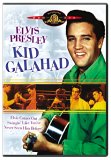| Reviews & Columns |
|
Reviews DVD TV on DVD Blu-ray 4K UHD International DVDs In Theaters Reviews by Studio Video Games Features Collector Series DVDs Easter Egg Database Interviews DVD Talk Radio Feature Articles Columns Anime Talk DVD Savant Horror DVDs The M.O.D. Squad Art House HD Talk Silent DVD
|
DVD Talk Forum |
|
|
| Resources |
|
DVD Price Search Customer Service #'s RCE Info Links |
|
Columns
|
|
|
Kid Galahad (1962)
After being discharged from the army, Walter Gulick (Presley) returns to his hometown, Cream Valley, in upstate New York. (The Southern-accented Gulick explains that while he was born in New York, he was actually raised in Kentucky. Right.) Having no luck finding work as a mechanic, he agrees to spar with an up-and-coming boxer at Willy Grogan's (Gig Young) training camp. Gulick's boxing impresses trainer Lew Nyack (Charles Bronson) while his polite manner and gentlemanly ways earns him the nickname "Galahad" from Dolly (Lola Albright), Willy's long-suffering girlfriend. Willy, it seems, is something of a loser, heavily in debt with his bookie and under pressure from an assistant district attorney (an uncredited Ed Asner in his second film appearance) to testify against gangster Otto Danzig (David Lewis, in a part played by Humphrey Bogart in the original version). Matters are complicated further when Willy's sister, Rose (Joan Blackman), falls for Galahad.
Somewhat peculiarly, many of Elvis' movies from this period cast him either as angry (and often irritating) young men types, homogenized James Deans forever picking fights, whining about their troubles, and badly treating those who try to help, particularly woman in love with him; or as care-free ne'er-do-wells, living fast and dangerously with a gaggle of girlfriends until one comes along with the patience to tame him. Galahad is neither of these: Elvis' character is simply a decent chap that plays very close to the kind of person Elvis apparently really was off-screen. Modest, unpretentious, and well-mannered, "Galahad" is old-fashioned in the good sense, the kind of young man any girl would be proud to bring home to Mom and Dad, even if he does swivel his hips when he sings.
The result is both Elvis and his character come off as eminently likable, while the story's plot and conflict are driven mainly by Willy's problems with the gangsters and his girlfriend. The former is generic and overly familiar, and David Lewis is no Humphrey Bogart though Richard Devon is very good as one of Danzig's hoods. Willy and Dolly's weary relationship is likewise a cliche, but the actors make it work for the most part. Albright brings to her part a Barbara Stanwyck-esque worldliness, she all too aware of her boyfriend's shortcomings and ready to cut her losses.
Young, who really carries the film on his shoulders more than Elvis does, had played breezy romantic leads for years but casting directors eventually tapped into a darker, melancholy facet of the actor put to good use in "Walking Distance," a candidate for the best-ever episode of The Twilight Zone, and culminating with his deeply disturbing role in They Shoot Horses, Don't They? (1969). In Kid Galahad, the slightly darker nature of that character is perhaps accidentally accentuated by Young's real-life alcoholism: in some scenes the actor's performance is off balance and some of his line readings appear slurred. The movie is ultimately about Willy's salvation, and overall Young pulls this off.
The real surprise in Kid Galahad is the quietly understated support of Charles Bronson, who during this time flirted with but never quite attained stardom, despite knockout supporting parts in movies like The Magnificent Seven (1960), The Great Escape (1963) and The Dirty Dozen (1967). Billed fifth, Bronson's enormous screen charisma dominates every scene he's in, and the script offers the actor several chances to show what would eventually make him a huge star in Europe and, some time later, the U.S. One sequence especially anticipates Bronson future roles: when Danzig and his men threaten him, tough guy Lew allows his hands to be broken rather than cede to their wishes.
Director Phil Karlson was generally a hack who got his start helming low budget dreck for Monogram before graduating to bigger if similarly unambitious studio product. (It was as if studios turned to Karlson when Gordon Douglas wasn't available.) Still, he handles the boxing scenes quite well, even incorporating a hand-held camera for some energetic angles, somewhat unusual in 1962.
Kid Galahad was apparently shot around Idyllwild, California, and the contrast between the beauty of this popular camping area with its pine trees and mountains and the outdoor ring and boxing action works nicely.
Video & Audio
Kid Galahad is presented in a 16:9 enhanced transfer with a 1.77:1 aspect ration from its original 1.85:1 theatrical format. The image is so-so, with a graininess typical of Deluxe's lab work of the period; opticals and the main titles are particularly weak. The mono sound is okay, though it's disappointing that stereo tracks of Elvis's songs weren't located/used as they have been on other studio's releases. Optional French and English subtitles are included; the songs aren't subtitled, however. There are no Extra Features, not even a trailer.
Parting Thoughts
Overall Kid Galahad is a pretty good film, thanks to Elvis' natural charm, some solid supporting performances and picturesque locales.
Stuart Galbraith IV is a Kyoto-based film historian whose work includes The Emperor and the Wolf - The Lives and Films of Akira Kurosawa and Toshiro Mifune and Taschen's forthcoming Cinema Nippon. Visit Stuart's Cine Blogarama here.
|
| Popular Reviews |
| Sponsored Links |
|
|
| Sponsored Links |
|
|
| Release List | Reviews | Shop | Newsletter | Forum | DVD Giveaways | Blu-Ray | Advertise |
|
Copyright 2024 DVDTalk.com All Rights Reserved. Legal Info, Privacy Policy, Terms of Use,
Manage Preferences,
Your Privacy Choices | |||||||













